Elevix Launch Signals New Push Toward Structured Startup Enablement in the GCC
Enhanced Hyundai Palisade Makes World Debut at the New York International Auto Show
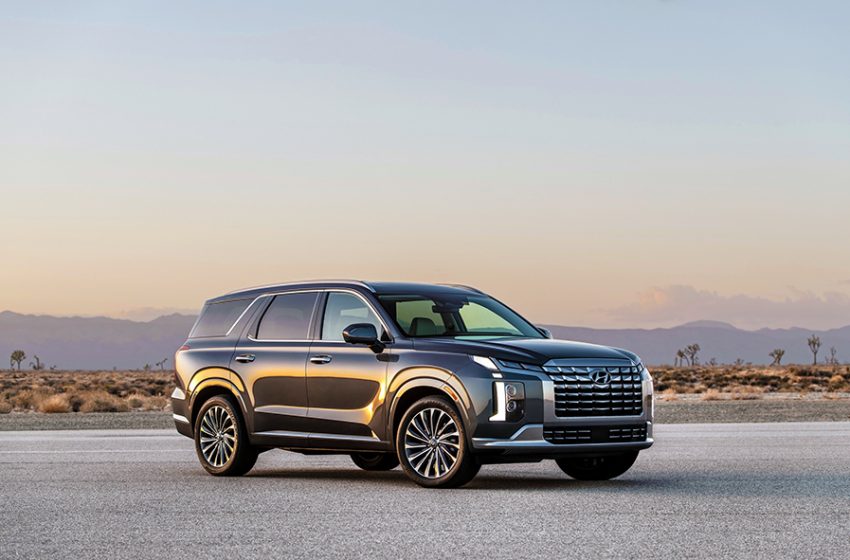
· The New Palisade Flagship SUV Offers Fresh Exterior and Interior Design
· New Convenience Technologies: 12-inch Navigation, WiFi Hotspot, Digital Key 2 Touch, New Bluelink Features and Driver’s Ergo Motion Seat
· New Driver Assistance Technology: Remote Smart Parking Assist, Enhanced Forward Collision Avoidance and Highway Driving Assist
SEOUL/NEW YORK, April 18, 2022 – Hyundai last week unveiled its significantly enhanced Palisade SUV in a global debut at the New York International Auto Show. The new Palisade offers freshened interior and exterior design cues, new infotainment and safety features, and advanced driver assistance systems.
“The enhanced Hyundai Palisade offers the design appeal and features worthy of Hyundai’s flagship SUV,” said Olabisi Boyle, vice president, product planning and mobility strategy, Hyundai Motor North America. “More than ever, Palisade is the ultimate family vehicle for daily use and memory-making road trips.”
Palisade New Enhancements and Available Features
Exterior
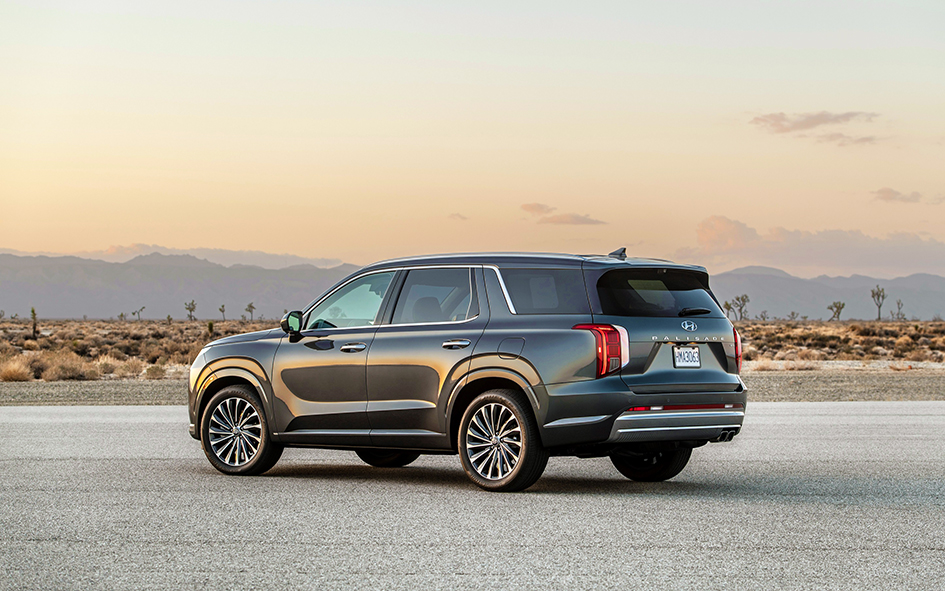
· New front and rear bumper fascia
· New front grille
· New headlamps and daytime running lights
· New multi-spoke alloy wheel design
· Auto-dimming outside mirrors
Interior
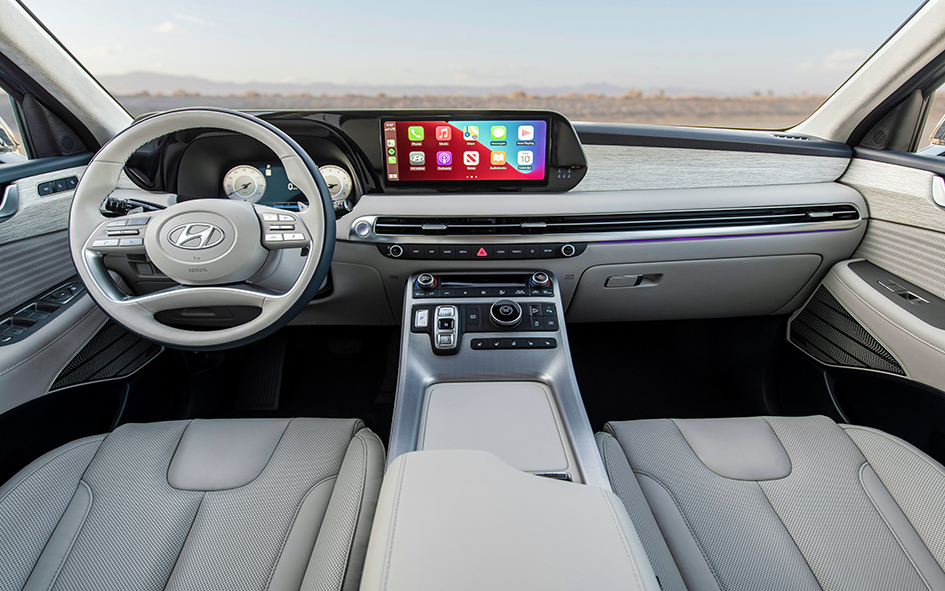
· New instrument panel, gauge cluster and audio interface design
· New steering wheel design
· New seating surfaces and materials
· Ergo-motion driver’s seat
· 2nd-row armrest angle adjuster 7P/8P (8P is first for Hyundai)
· Heated 3rd-row seats (first application for Hyundai)
· Acoustic-laminated rear door glass (Calligraphy model)
Infotainment/Convenience Technology
· 12-inch navigation with 720p resolution
· Digital, full-display centre rearview mirror (first application for Hyundai)
· WiFi hotspot (first application for Hyundai)
· Digital Key 2 Touch (compatible with iPhone and Android)
· New Bluelink features (see Bluelink detail)
· Enhanced USB-C ports replace USB-A ports (quicker charging up to 3 amps)
· Enhanced wireless device charging (from 5W to 15W)
· Enhanced dynamic voice recognition
Advanced Driver Assistance Systems
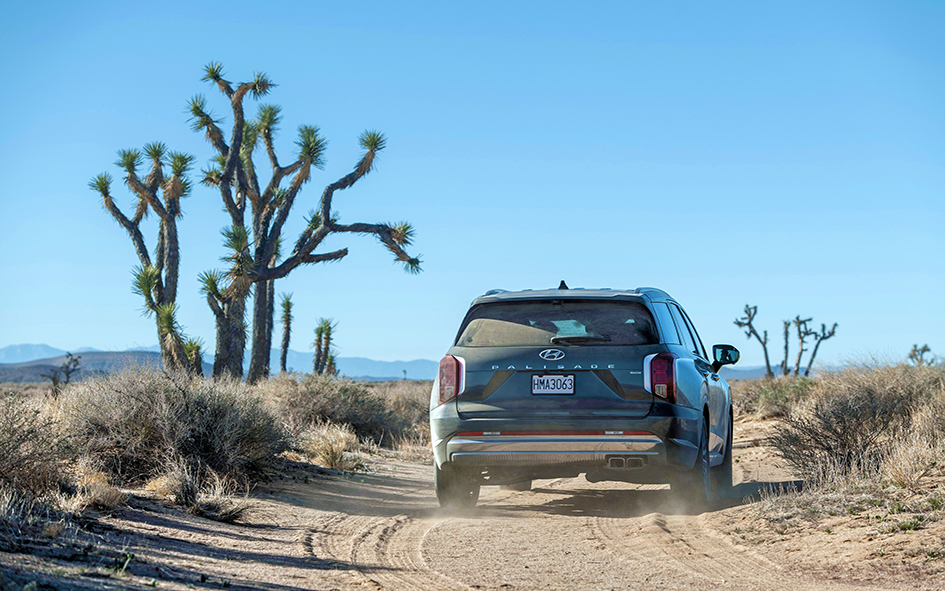
· Forward Collision-Avoidance Assist
· Navigation-based Smart Cruise Control
· Highway Driving Assist
· Reverse Parking Collision-Avoidance Assist
· Remote Smart Parking Assist
Passive Safety Technology
· Standard rear side-impact airbags
Flagship SUV Design
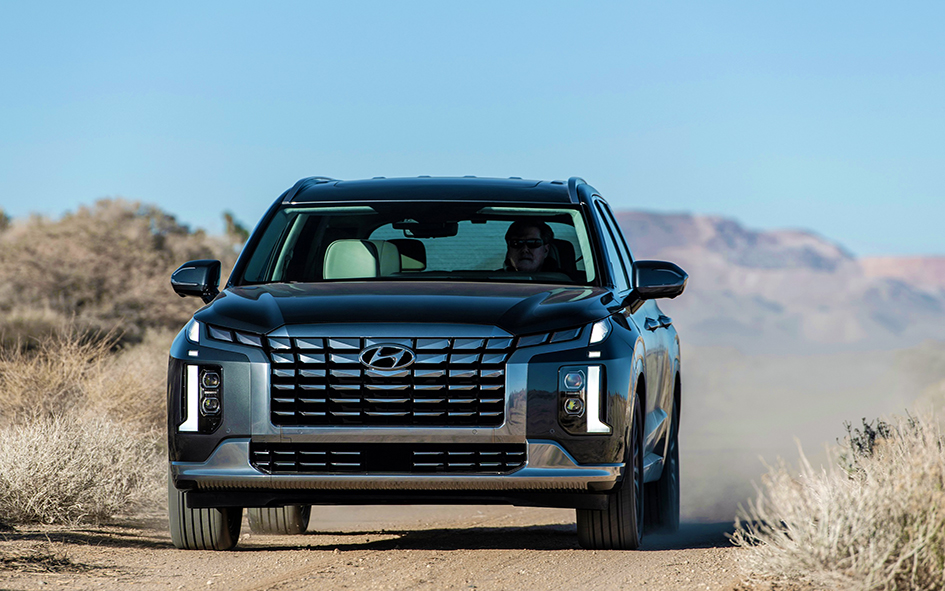
The design of the new Palisade conveys dignified refinement with clear differentiation worthy of a flagship SUV. A wider cascading grille form outlines rugged parametric shield elements for a premium appearance. The new forward lighting signature features vertically-connected LED composite lights that frame the grille creating a sharp-edged, technical appeal. New, 20-inch multi-spoke alloy wheels fill the wheel openings for a premium flagship presence. New strake detailing on the lower front skid plate element further conveys a rugged demeanour. The powerful, extended hood profile creates an impressive road presence, while bold C-pillars and panoramic side glass graphics convey generous third-row spaciousness. The rearview emphasizes a wide, stable stance via vertical LED taillamps and lower fascia skid plate details.
This design has aerodynamic benefits as well, with specific design cues that include a fast A-pillar angle, a rear spoiler side garnish, an optimized front cooling area with an extended internal air guide, aero underside panels, and rear-wheel aero deflectors.
Intuitive Utility and Premium Design Elements
The new Palisade now offers an innovative Ergo driver’s seat designed to provide comfort and help reduce fatigue during long drives. Palisade’s third-row seating now offers to heat for its passengers, a first for Hyundai. The second row of seats now offers wing-out headrests and seat ventilation for extra comfort. For the driver, an available full-display centre rearview mirror uses a rearview camera to allow the driver to clearly see behind the Palisade without the obstructions of passengers or cargo. New, slim horizontal air vents add a sense of spaciousness and premium ambience. The instrument panel has been redesigned for a more voluminous appearance with new ambient lighting themes.
Wireless charging capability has been upgraded from 5 watts to 15 watts for faster device charging. The new Palisade supports the latest version of Hyundai Digital Key. Digital Key 2 Touch allows owners to leave their car key at home and use an iPhone, Apple Watch, or a supported Android phone to lock, unlock, and start their vehicle. After the car key has been added to Apple Wallet or Samsung Pass, users can simply hold the supported device near the door handle to lock or unlock the car. Touching an Apple Watch near or placing the phone in the wireless charger and then pressing the start button allows the driver to start the Palisade’s engine. Apple Wallet or Samsung Pass also allows secure sharing of keys with family and friends. The new Palisade is also the first Hyundai vehicle to offer Wi-Fi hotspot capability. Customers with cellular connectivity will be able to provide a hotspot that allows others to browse the internet, stream videos or music and more – just like at home.
The interior design combines a sense of relaxation and comfort creating a serene environment with eight-passenger seating standards for family adventures. The One-Touch second-row seat allows for easy operation to move the seat forward and out of the way for easy access into and out of the third-row seat. For more convenience, the third row offers power-folding/unfolding and reclining seats. Second-row captain’s chairs are also available. USB-C outlets have been added for faster device charging throughout the interior, providing extra convenience for all passengers. Even more, a conversation mirror allows the driver to clearly see passengers in the rear.
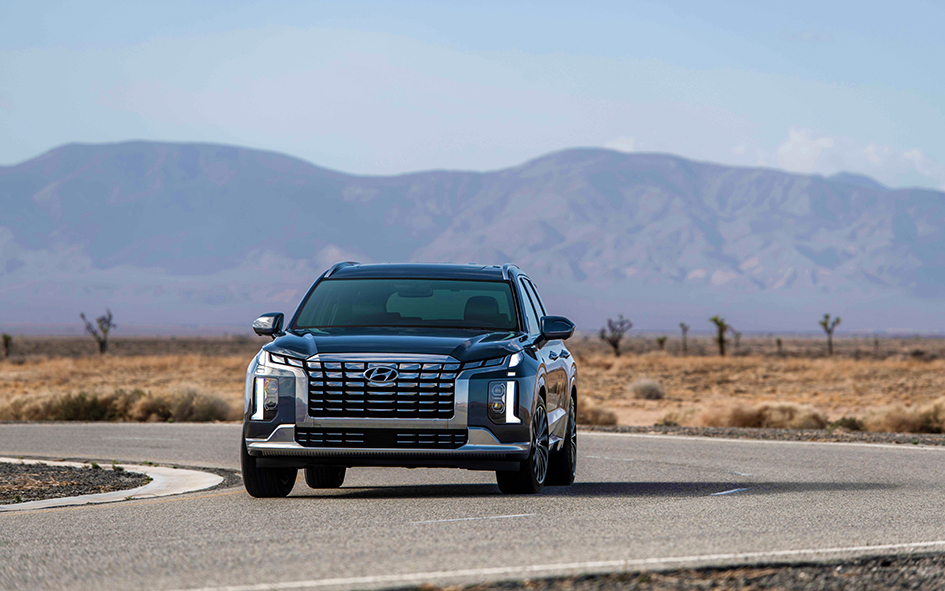
Ultrasonic Rear Occupant Alert monitors the rear seats to detect the movements of children and pets, reminding drivers to check the rear seats when exiting the vehicle; if the system detects movement in the rear seats after the driver leaves and locks the vehicle, it can sound the horn and send an alert to the driver’s smartphone via Bluelink. The system is designed to help prevent children and pets from being forgotten in the car, but it can also help in case of children accidentally lock themselves in.
Powertrain
Palisade power comes from an Atkinson-cycle 3.8-litre V6, dual CVVT, direct-injected engine, for excellent power and efficiency. This 3.8-litre powerplant produces an estimated 291 horsepower @ 6,000 rpm and an estimated 262 lb.-ft. of torque @ 5,200 rpm. Palisade delivers that power to the wheels via a refined eight-speed automatic transmission with a multi-plate torque converter and offers both two-wheel and HTRAC® four-wheel-drive configurations, with a final drive ratio of 3.648 for confident acceleration. Palisade is extremely quiet, with generous under-hood insulation, special sound-deadening carpets and powertrain tuning that delivers smooth, linear response. In addition, Palisade offers drivers the ability to start the vehicle via a remote key fob or via the Blue Link app.
HTRAC® With New Tow Mode Capability
The new Palisade offers Hyundai’s HTRAC® All-Wheel-Drive (AWD) system, which adds Tow Mode. Tow Mode adjusts the towing powertrain profile, holding lower gears longer and reducing the frequency of shifting response. The HTRAC AWD system was developed as a multi-mode system, providing an electronic, variable-torque-split clutch, with active torque control between the front and rear axles. The driver-selectable HTRAC Normal, Sport and Smart modes help provide confident control in all weather conditions. The Sport setting gives a more agile feel by sending more available torque to the rear wheels, for a sporty dynamic feel when desired. This system has a wider range of torque distribution variability than many competitive systems and has been tuned to conditions such as straight-line acceleration, medium- or high-speed cornering, and hill starts.

New Safety and Convenience Technologies
Hyundai Motor has implemented a number of safety technologies on the new, high-tech Palisade, with rear side-impact airbags as standard equipment to help provide additional occupant protection. Its generous suite of advanced driver assistance systems includes many innovative technologies, including forwarding Collision-Avoidance Assist, Blind-Spot Collision-Avoidance Assist, Safe Exit Assist, Driver Attention Warning, High Beam Assist, Navigation-based Smart Cruise Control, Lane Following Assist, Highway Driving Assist, Rear Cross-Traffic Collision-Avoidance Assist, Reverse Parking Collision-Avoidance Assist and Remote Smart Parking Assist.
Forward Collision-Avoidance Assist (FCA)
Forward Collision-Avoidance Assist helps to avoid collisions with objects in front of the vehicle while driving. If a preceding vehicle suddenly slows, or if a forward-collision risk is detected, such as a stopped vehicle or a pedestrian, it provides a warning. After the warning, if the risk of the collision remains, it can assist with emergency braking. While driving, if there is a risk of collision with a cyclist ahead, or with an oncoming vehicle while turning at an intersection, it can help assist with emergency braking. While driving through an intersection, if there is a risk of collision with oncoming vehicles detected from the left or right, it can assist with emergency braking. When changing lanes while driving, if there is a risk of collision with an oncoming vehicle detected in the next lane or a preceding vehicle in the next lane, it can assist with the steering to help avoid a collision. If there is a risk of collision with a pedestrian detected, partially in the vehicle’s intended path, it can assist with the steering to help avoid a collision.
Lane Keeping Assist (LKA)
Lane Keeping Assist helps to keep the vehicle within the lane while driving.
Blind-Spot Collision-Avoidance Assist (BCA)
Blind-Spot Collision-Avoidance Assist helps to avoid collisions with a rear-side vehicle when changing lanes. When operating the turn signal to change lanes, if there is a risk of collision detected with a rear-side vehicle, it can provide a warning. If exiting a parallel parking spot and there is a risk of collision detected with a rear-side vehicle, it can assist with emergency braking.
Safe Exit Assist (SEA)
Safe Exit Assist can help avoid collisions with a rear side vehicle detected when exiting the vehicle. When the occupant opens the door to exit the vehicle after a stop, if an approaching vehicle from the rear side is detected, it provides a warning. It can also help keep the rear door closed through the operation of the electronic child lock when a potential collision is detected.
Driver Attention Warning (DAW)
Driver Attention Warning analyzes the driver’s attention while driving and can warn the driver of inattentive driving inputs.
High Beam Assist (HBA)
High Beam Assist can help switch high beam lights on and off at night for approaching vehicles in the opposite oncoming lane.
Smart Cruise Control (SCC)
Smart Cruise Control helps maintain distance from the vehicle ahead and drive at a speed, set by the driver. The vehicle stops automatically and starts automatically if the vehicle in front starts in a short time. If a period of time has elapsed, start again by pressing the accelerator pedal.
Navigation-based Smart Cruise Control (NSCC)
Navigation-based Smart Cruise Control can help maintain safe speeds on the highway using navigation data. In a highway curved section, the speed can be reduced appropriately before entering the curve. When leaving the curved section, the speed can return to the original setting.
Lane Following Assist (LFA)
Lane Following Assist helps to keep the vehicle centred within the lane while driving.
Highway Driving Assist (HDA)
Highway Driving Assist helps maintain a set distance and speed from the vehicle ahead when driving on a highway and helps centre the vehicle in the lane, even when driving through curves.
Rear Cross-Traffic Collision-Avoidance Assist (RCCA)
Rear Cross-Traffic Collision-Avoidance Assist can help avoid collisions with oncoming vehicles detected on the left or right side of the vehicle while reversing. If there is a risk of collision detected with an oncoming vehicle on the left or right side while reversing, it provides a warning. After the warning, if the risk of the collision remains, it can assist with emergency braking.
Reverse Parking Collision-Avoidance Assist (PCA)
Reverse Parking Collision-Avoidance Assist can help avoid collisions with rearward objects detected while reversing. If there is a risk of collision detected with a rearward object while reversing, the system provides a warning. After the warning, if the risk of the collision remains, it can assist with emergency braking.
Remote Smart Parking Assist (RSPA)
Remote Smart Parking Assist helps remotely park or exit a parking spot from outside the vehicle.
In addition, Palisade now applies nine standard airbags: dual front, dual side-front and rear, driver’s knee, and roll-over-sensing side-curtain airbags. Palisade uses a full-length large side curtain airbag that includes third-row seating coverage for enhanced rear occupant protection in the event of a collision. Palisade has a very rigid structure, with strategic use of Advanced High Strength Steel (AHSS) in key areas to provide increased tensile strength. The use of Advanced High Strength Steel has several benefits: lighter overall vehicle weight and greater vehicle strength and rigidity without the excessive costs of more exotic lightweight materials. Robust underbody and side structures are designed to increase energy absorption and cabin intrusion in a severe collision, especially in the small overlap test. Further, its underbody uses multiple load paths to better disperse potential crash energy in the event of a collision.








